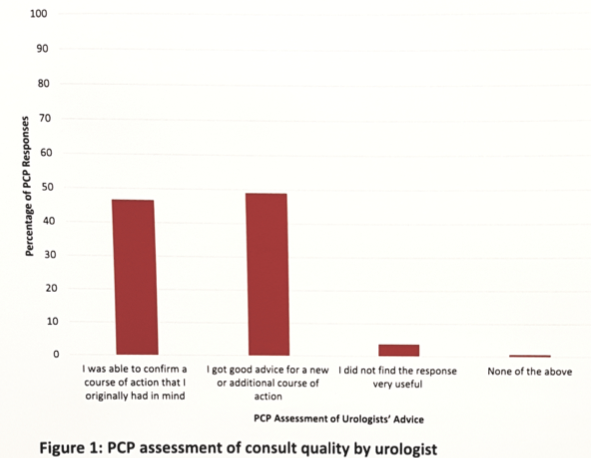For this study, urologist feedback reports from primary care physicians completed through the Champlain BASE service from March 2013 to November 2017 were analyzed. This service is a secure web-based system, where primary care physicians are able to send eConsults, instead of requesting a formal in-office consultation for a patient. Each anonymized report allowed primary care physicians to answer five questions regarding how the eConsult affected the medical management of their patient, as well as the educational value of the interaction with the urologist. Feedback was given using either direct response or ranking via a five-point Likert scale.
Among 411 feedback reports analyzed for this study, 89% ranked the urologist’s advice as 4/5 for usefulness to their patient, and 90% ranked the overall usefulness of the eConsult to the primary care physician as 4/5.

After October 2016, a question regarding educational value was added to the survey: among 115 surveys with this additional question, 86% of primary care physicians stated that the educational value of the consult was 4/5. Only 2% of feedback reports reflected that there was no use of the eConsult to either the patient or the primary care physician. Finally, 32% of eConsults where a referral was anticipated to be needed by a primary care physician were avoided.
The unique aspect of this study is that primary care physicians have the ability to provide feedback to the urologist and allowing improvement measures to be implemented expeditiously. A possible drawback of the study is that for these evaluations to work, both the primary care physicians (providing feedback) and urologists (receiving feedback) must be open to the time and effort of providing/receiving evaluation. Dr. Lee concluded that programs such as the Champlain BASE eConsult service allow for constant feedback to surgeons with regards to the quality of care as perceived by their primary care physician colleagues. This allows ongoing professional development for surgeons throughout their career, and an opportunity for reflection on their practice methods.
Presented by: Justin Lee, University of Ottawa, Ottawa, Ontario, Canada
Co-Authors: Luke Witherspoon1, John Mahoney1.
1Urology, University of Ottawa, Ottawa, ON, Canada
References:
1. Lockyer J, Violato C, Fidler H. Likelihood of change: A study assessing surgeon use of multisource feedback data. Teach Learn Med 2003;15:168-174.
Written By: Zachary Klaassen, MD, Urologic Oncology Fellow, University of Toronto, Princess Margaret Cancer Centre Twitter: @zklaassen_md at the 73rd Canadian Urological Association Annual Meeting - June 23 - 26, 2018 - Halifax, Nova Scotia


